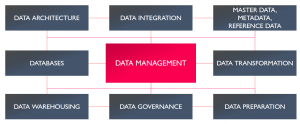Navigating Five Pitfalls of (In)Effective Data Management
Data Management Solutions: Addressing Common Pitfalls and Improving Data Understanding
A recent survey shows that data decision-makers find it extremely difficult to understand the complexity of their organizations’ data estates – essentially, what data they have, how the data is used, and who owns it. The report, conducted by global research company Forrester for Capital One, suggests:
- 80% struggle with poor data quality
- 76% have difficulty understanding data
- 74% suffer from a lack of data observability
These challenges occur regularly and are faced by enterprises across multiple sectors. This article highlights five of the most common pitfalls of ineffective data management – and provides guidance on stopping them from hampering your organization.
Data Management Strategies: Addressing Organisational Challenges
Failure to establish data as an organizing principle: Companies invest heavily in data management and digital transformation. However, they are often not structured around data as an organizing principle, and this cultural failure means they struggle to reap tangible rewards. Data management covers many areas including collecting, processing, validating, storing, and visualization, as shown in the illustration below. Each piece of the pie needs close and careful attention and requires a holistic approach to implementation.

Data management considerations and actions
Chief Data Officer Role: Defining Responsibilities and Impact
Poorly defining the role of CDO: The chief data officer has become prominent in many enterprises. Yet frequently, the role lacks definition. CDOs should be a board-level appointment, with the incumbent reporting straight to the CEO. The CDO should have budget responsibility and clear visibility of the data they own. Many organizations interpret the role as that of an “operator” – with data treated as a cost centre, not a growth driver, which is simply incorrect as an organizing principle. Clearly defining the role of the CDO is a critical consideration. Handled correctly, the CDO can become the champion of effective data management, fostering a data-driven culture and ensuring that data is utilized as a strategic asset for an organization’s success.
Data Integration Strategies: Promoting Collaboration and Efficiency
Defensive attitudes to data: Too often, data is contained within closely guarded, divisional siloes, with internal competition and self-interest restricting access to what is a business-critical enabler. The siloed thinking reduces data visibility, causing inefficient and inconsistent data analysis – and can even increase governance and security risks. Organizations must implement effective data integration strategies that promote sharing and collaboration based on relevant access protocols. Only then can data management excellence start to emerge.
Achieving Balance With Technology Integrations
Putting technology rather than solutions first: Data decision-makers find themselves anchored to building specific technologies rather than being solutions-focused. Technology is just one piece of the puzzle and being wedded to a particular platform or software without considering the broader context can cause significant problems, from vendor lock-in, cost inefficiencies, under-utilization, and more. A more structured path based on forming business objectives, defining use cases and requirements, and adopting an agnostic technology mindset needs to be established. This can result in a more balanced and practical approach to data management focusing on flexibility and long-term sustainability.
Effective Data Management
Failing to get buy-in from stakeholders: Effective data management is about more than technology platforms – it also requires cultural transformation. That means clearly defining and communicating the value of data and ensuring that employees feel adequately supported by education and training. Employees need to understand their role in collating, inputting, analyzing, and applying data across the business and appreciate and understand how they will benefit personally from the outputs. This foundation helps to instill an organization-wide data-centric mindset through cross-collaboration between departments.
These are some of the common obstacles to effective data management. Here at Portera, we take a multidisciplinary consultancy approach to ensure that data is fully connected across operations and functions – unlocking value, increasing revenue, and providing a good return on investment. We can help alleviate data management challenges by providing new thinking, processes, governance, and capabilities that turn data into a source of competitive advantage.
Click here to find out more.

